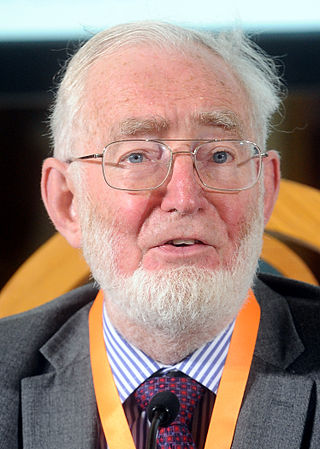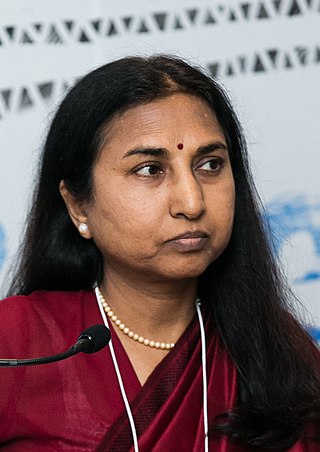Related Research Articles

Gross domestic product (GDP) is a monetary measure of the market value of all the final goods and services produced in a specific time period by a country or countries. GDP is most often used by the government of a single country to measure its economic health. Due to its complex and subjective nature, this measure is often revised before being considered a reliable indicator.

Joseph Eugene Stiglitz is an American New Keynesian economist, a public policy analyst, and a full professor at Columbia University. He is a recipient of the Nobel Memorial Prize in Economic Sciences (2001) and the John Bates Clark Medal (1979). He is a former senior vice president and chief economist of the World Bank. He is also a former member and chairman of the Council of Economic Advisers. He is known for his support for the Georgist public finance theory and for his critical view of the management of globalization, of laissez-faire economists, and of international institutions such as the International Monetary Fund and the World Bank.
The green gross domestic product is an index of economic growth with the environmental consequences of that growth factored into a country's conventional GDP. Green GDP monetizes the loss of biodiversity, and accounts for costs caused by climate change. Some environmental experts prefer physical indicators, which may be aggregated to indices such as the "Sustainable Development Index".
National accounts or national account systems (NAS) are the implementation of complete and consistent accounting techniques for measuring the economic activity of a nation. These include detailed underlying measures that rely on double-entry accounting. By design, such accounting makes the totals on both sides of an account equal even though they each measure different characteristics, for example production and the income from it. As a method, the subject is termed national accounting or, more generally, social accounting. Stated otherwise, national accounts as systems may be distinguished from the economic data associated with those systems. While sharing many common principles with business accounting, national accounts are based on economic concepts. One conceptual construct for representing flows of all economic transactions that take place in an economy is a social accounting matrix with accounts in each respective row-column entry.

The Canadian Index of Wellbeing (CIW) is a composite index, composed of eight interconnected domains that measures stability and change in the wellbeing of Canadians over time. The CIW describes wellbeing as, "The presence of the highest possible quality of life in its full breadth of expression, focused on but not necessarily exclusive to: good living, standards, robust health, a sustainable environment, vital communities, an educated populace, balanced time use, high levels of democratic participation, and access to and participation in leisure and culture". The CIW acts as a companion measure of societal progress to the Gross Domestic Product (GDP), which is based solely upon economic productivity.

Sir Anthony Barnes Atkinson was a British economist, Centennial Professor at the London School of Economics, and senior research fellow of Nuffield College, Oxford.
A person's livelihood refers to their "means of securing the basic necessities of life". Livelihood is defined as a set of activities essential to everyday life that are conducted over one's life span. Such activities could include securing water, food, fodder, medicine, shelter, clothing. An individual's livelihood involves the capacity to acquire aforementioned necessities in order to satisfy the basic needs of themselves and their household. The activities are usually carried out repeatedly and in a manner that is sustainable and providing of dignity. For instance, a fisherman's livelihood depends on the availability and accessibility of fish.

Bina Agarwal is an Indian development economist and Professor of Development Economics and Environment at the Global Development Institute at The University of Manchester. She has written extensively on land, livelihoods and property rights; environment and development; the political economy of gender; poverty and inequality; legal change; and agriculture and technological transformation.
This is a list of first-level country subdivisions by nominal gross state product. This list shows top 100 largest subdivisions by GDP nominal and PPP. Those subdivisions which are the largest in their respective countries are shown in bold.

Enrico Giovannini is an Italian economist, statistician and academic, member of the Club of Rome. Since February 2021, he has been serving as Minister of Infrastructure and Sustainable Mobility in the Draghi Government. From April 2013 to February 2014, he served as Minister of Labour and Social Policies in the Letta Government. From 2009 to 2013, he held the office of President of the Italian National Institute of Statistics (Istat).

Sustainability measurement is a set of frameworks or indicators to measure how sustainable something is. This includes processes, products, services and businesses. Sustainability is difficult to quantify. It may even be impossible to measure. To measure sustainability, the indicators consider environmental, social and economic domains. The metrics are still evolving. They include indicators, benchmarks and audits. They include sustainability standards and certification systems like Fairtrade and Organic. They also involve indices and accounting. And they can include assessment, appraisal and other reporting systems. These metrics are used over a wide range of spatial and temporal scales. Sustainability measures include corporate sustainability reporting, Triple Bottom Line accounting. They include estimates of the quality of sustainability governance for individual countries. These use the Environmental Sustainability Index and Environmental Performance Index. Some methods let us track sustainable development. These include the UN Human Development Index and ecological footprints.
The Commission of Experts on Reforms of the International Monetary and Financial System, chaired by Joseph Stiglitz and not to be confused with the concurrent Commission on the Measurement of Economic Performance and Social Progress he also chaired, was convened by the President of the United Nations General Assembly, Miguel d'Escoto Brockmann, "to review the workings of the global financial system, including major bodies such as the World Bank and the IMF, and to suggest steps to be taken by Member States to secure a more sustainable and just global economic order".

The Center for Business and Economic Research (CBER), formerly the Bureau of Business Research, is an economic policy and forecasting research center housed within the Miller College of Business at Ball State University in Muncie, Indiana, USA. CBER research encompasses health care, public finance, regional economics, transportation, and energy sector studies. In addition to research, CBER serves as the forecasting element in the Muncie area – hosting five state and federal economic forecasting roundtables.

Jean-Paul Fitoussi was a French economist and sociologist of Sephardi Jewish descent.
The OECD Better Life Index, created in May 2011 by the Organisation for Economic Co-operation and Development, is an initiative pioneering the development of economic indicators which better capture multiple dimensions of economic and social progress.
Although for many decades, it was customary to focus on GDP and other measures of national income, there has been growing interest in developing broad measures of economic well-being. National and international approaches include the Beyond GDP programme developed by the European Union, the Better Lives Compendium of Indicators developed by the OECD, as well as many alternative metrics of wellbeing or happiness. One of the earliest attempts to develop such an index at national level was Bhutan's Gross National Happiness Index and there are a now a number of similar projects ongoing around the world, including a project to develop for the UK an assessment of national well-being, commissioned by the Prime Minister David Cameron and led by the Office for National Statistics.
Social VAT is the earmarking of a defined amount of VAT revenues to finance social security. The shift from taxing labour to taxing consumption in order to finance social security is based on several premises.
Labour rights in New Zealand are largely covered by both statute, particularly the Employment Relations Act 2000, and common law. The Ministry of Business, Innovation and Employment carries out most of the day to day administrative functions surrounding labour rights and their practical application in the state.

In statistics and research design, an index is a composite statistic – a measure of changes in a representative group of individual data points, or in other words, a compound measure that aggregates multiple indicators. Indexes – also known as composite indicators – summarize and rank specific observations.
The Goa Lokayukta is the ombudsman institution of the Indian state of Goa.The Lokayukta is an anti-corruption ombudsman existing in several states of India.
References
- ↑ "Commission on the Measurement of Economic Performance and Social Progress - Home page". Archived from the original on 2015-07-20. Retrieved 2013-01-29.
- ↑ Jolly, David (September 14, 2009). "G.D.P. Seen as Inadequate Measure of Economic Health". The New York Times . Retrieved 29 January 2013.
- ↑ "Archived copy" (PDF). Archived from the original (PDF) on 2016-08-06. Retrieved 2016-12-31.
{{cite web}}: CS1 maint: archived copy as title (link) - ↑ "Archived copy" (PDF). Archived from the original (PDF) on 2014-02-11. Retrieved 2013-01-29.
{{cite web}}: CS1 maint: archived copy as title (link)